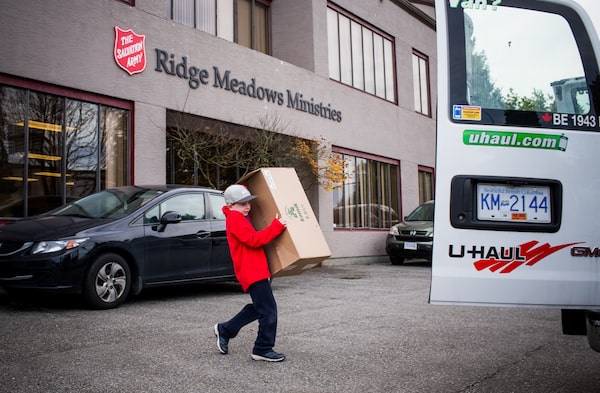
Ryder Moore, 8, is fundraising to buy homeless people rain boots and other items.Ben Nelms
Ask eight-year-old Ryder Moore how he feels about his project to raise money to help people in need, and his voice bubbles with excitement while answering: “Happy!”
Ryder and his family live in Maple Ridge, B.C., a Vancouver-area city of about 82,000 where donning rain gear is second nature because of the weather. One soggy September day in 2016, during a family drive in Vancouver’s Downtown Eastside, Ryder spotted people on the street in tattered clothes and with no waterproof footwear. It prompted a family conversation about homelessness and poverty.
“I wanted to give away my boots,” the Grade 2 student says.
That marked the beginning of Ryder’s Rainboots, a fundraiser launched with the help of his younger brother Brody and their parents, Douglas College teachers Sarah and Mike Moore. So far, through the GoFundMe crowdfunding site, a special Facebook page, raffles and selling cookies, they have collected more than $10,000 to buy rain boots and clothing such as ponchos and briefs. With the help of the Salvation Army, the items are distributed to men, women and children in need. Ryder takes particular pride in writing a note to each recipient that says, “Hope these boots keep your feet dry.”
“We have had a ton of community members gather around us,” says Sarah Moore as the family prepares to launch the third annual campaign. “Ryder has built a passion and flourished, and learned more about why people are living in shelters and on the streets, and in poverty.”
Charity in Canada
It’s difficult to pin down the extent of charitable giving in Canada. Separate reports by the Fraser Institute, a think tank, and Canada Helps, an online platform for donating and fundraising, have concluded it declined from 2006-2016.
But a Statistics Canada report released in February, 2017, says $9.1-billion in donations were claimed on income tax returns in 2015, a nearly-4-per-cent increase from the year before. That excludes money that doesn’t generate tax receipts, such as contributing to an office fundraiser, donating toonies at a grocery store supporting a cause, or buying auction goods to help a local sports team.
Data aside, you can’t put a price tag on the joy of charitable giving. In fact, contrary to the old saying “money doesn’t buy happiness,” there’s evidence it can.
American business magnate Warren Buffett said he “couldn’t be happier” he decided to donate the bulk of his billions in wealth to charity. But even giving modest amounts of money tends to make us happier than spending on ourselves, contributing to health and well-being, according to research by Elizabeth Dunn, a University of British Columbia psychology professor.
“Most charities start because a person saw a need and decided to do something about it,” says Larry Matthews, who helps non-profit organizations develop fundraising programs.
People who donate their time to raise money for charity tend to possess another level of generosity, says Mr. Matthews, vice-president of KMA Consultants Inc., which helps non-profit organizations with fundraising and communications, and has offices in Toronto and Moncton, N.B.
“There’s lots of evidence that volunteers are also donors, but not all donors are volunteers.”
Deborah Danie inside the Toronto bus she is working to convert to shower facilities for homeless people.Glenn Lowson/The Globe and Mail
Another person who is taking on a project to help homeless people is Deborah Daniel, a single mother in Toronto and a program manager for the non-profit Women in Music and Art, which works toward gender equality in those industries.
Her first volunteer effort is Hygiene on Wheels (HOW). Over the past several months, she has been raising funds to convert an old Toronto Transit Commission bus into shower and laundry facilities for the homeless community.
She conceived HOW after learning of similar projects in San Francisco, Los Angeles and Australia, and seeing a woman wash herself using a sink in the restroom of a Toronto public library. Ms. Daniel, 44, secured the retired bus from the TTC in December.
She has since used her own money to have it towed to a truck stop in suburban Toronto, and has been paying $200 monthly to keep it there until the mobile service is up and running, hopefully by this summer. She has also started a GoFundMe campaign to raise $100,000, is planning a Harry Potter-themed fundraiser for April 8, and has even tried to reach out to recording star Drake, who recently donated tens of thousands of dollars for other causes in Miami.
Ms. Daniel already has her sights set on acquiring two more donated TTC buses.